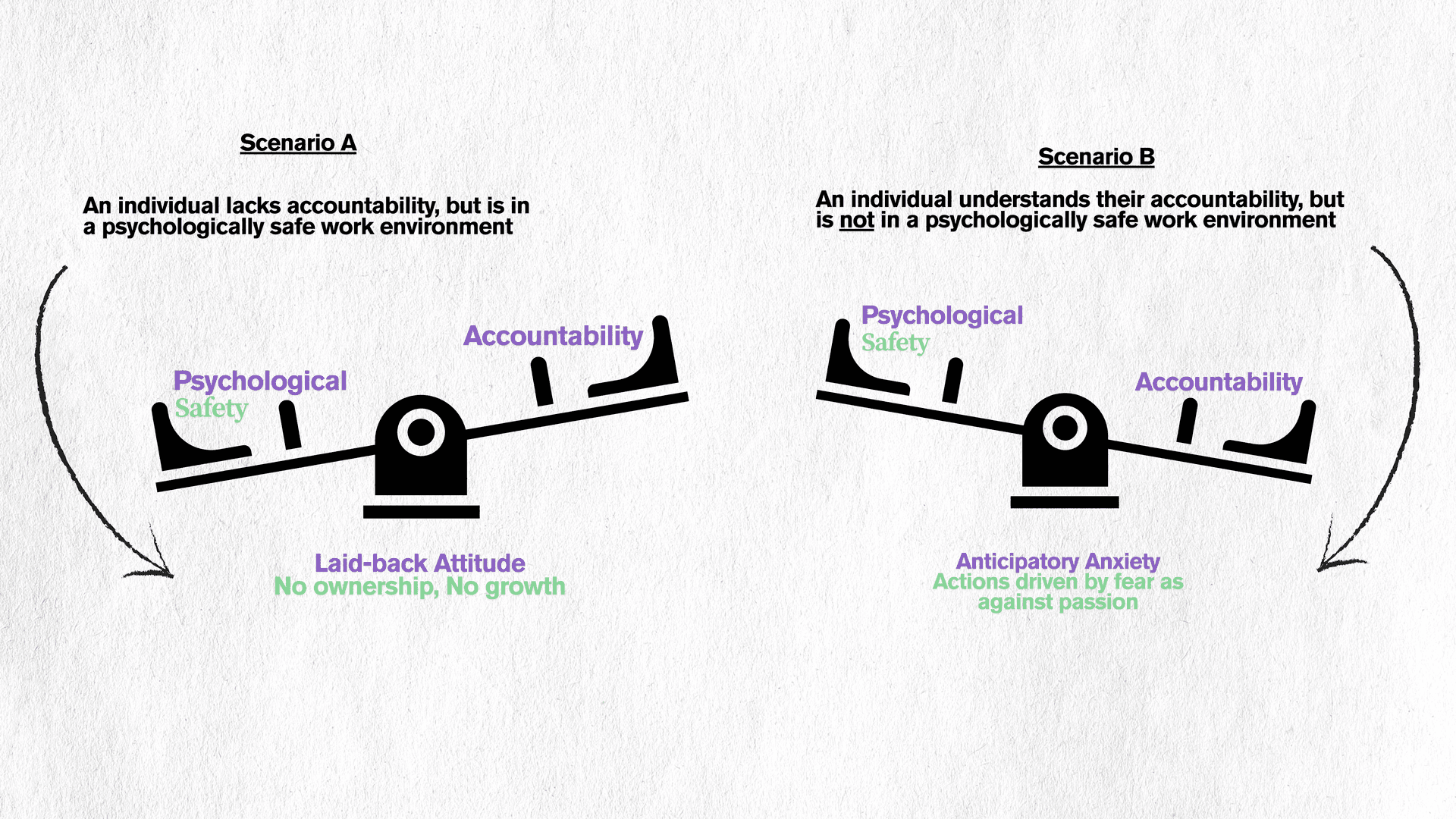The See-Saw of Workplace: Feat. Psychological Safety
Once a part of water cooler conversations, the topic of psychological safety has now found its place in the boardroom. While the term was used earlier by Carl Rogers in the 1950s regarding individual creativity, Amy Edmondson's work in the late 90s focused specifically on the workplace context. She puts a simple perspective on the subject.
It is “a belief that one will not be punished or humiliated with ideas, questions, concerns, or mistakes, and that the team is safe for interpersonal risk-taking."
You know you are in a psychologically safe work environment when you are not worried about the consequences of your every little action. An environment where your ideas are unwelcome, often sabotaged, and your intentions are always questioned, there is no room for psychological safety.
One of the reasons why it is missing in so many workspaces is the over the top perception of an employee’s accountability. Sometimes the expectation is almost inhumane. This is evident with the fact that such work environment treats errors as blunders and are therefore seen as unsafe for mental wellbeing.
Of course, individual accountability is also important and we are going to talk about it along with the subject of psychological safety because it is an inherent part of the equation. A psychologically safe environment is provided by the Organization through its responsible managers, and there is an equal amount of responsibility expected from the individual at the receiving end.
Therefore it's a see-saw almost always trying to find a balance: 
Neither of these extremes are good.
Let’s understand these scenarios with simple instances:
Scenario A (Left See-Saw):
You are going to work everyday unmotivated and almost only out of duty rather than growth or passion. You wait for the tasks to come your way, and in the mean time you spend time questioning your worth in the Organisation, your purpose of life and what flavour coffee should you try next. Meanwhile, the Organisation works in a culture, where there is no motivation to drive self-motivated teams and are satisfied with the bare minimum task-to-task achievements.
Scenario B (Right See-Saw):
You are driven and passionate about your work, have made several strides in the field and are willing to grow further. As time passes and your team grows, the dynamics change between the team members, due to any reason - change in leadership, entering or leaving of member/s, personal life impact, etc.
You are the same motivated and driven person, but your level of credibility and performance is now monitored through a microscopic lens, your autonomy of work is gone; or you are made to feel that your work, your credibility has to be justified at every step.
None of the above situations are ideal for growth. The first is lack of accountability; and the second is lack of psychological safety.
This is not good either for the individual or the Organisation. But we often find people stuck in either of the two situations, mostly unaware of the vicious loop they are stuck in. Simply a nudge of awareness and separating self from the situation and looking at the bigger picture would help them see the complete see-saw. Then accordingly shifts can be made to bring in a balance.
So the first step is identifying, or acknowledging this. People who often have a high sense of accountability, may often fall prey to scenario B and find themselves drowning in self-doubt & self-sabotage. It is crucial to be careful of this in the early stages of career, not only for the individuals but for the managers, as it is up to them to see that their team members don’t fall into such trap holes.
Signs you are in a psychologically safe work environment:
- You can be open about your mistakes and gaps fearlessly, as you are treated respectfully in tough times and good times alike.
- You are given the openness to own your space without untimely questioning and constant need for tiny updates.
- You can give honest feedback to your manager, knowing that it will be taken in good faith.
- Your little wins are valued and appreciated.
How can managers ensure they provide such work environment:
- Take feedback on feedback - Understand how your feedback is helping the person - is it constructive and energising or is it crushing and devastating!
- Vulnerability - Sharing if you’ve messed up, and that way showing they can too.
Adam Grant beautifully worded in his podcast: https://podcasts.apple.com/in/podcast/worklife-with-adam-grant/id1346314086?i=1000713190423
The idea of psychological safety is not that you’re supposed to be shielded from discomfort, but the exact opposite. It is that you can have, uncomfortable conversations.
